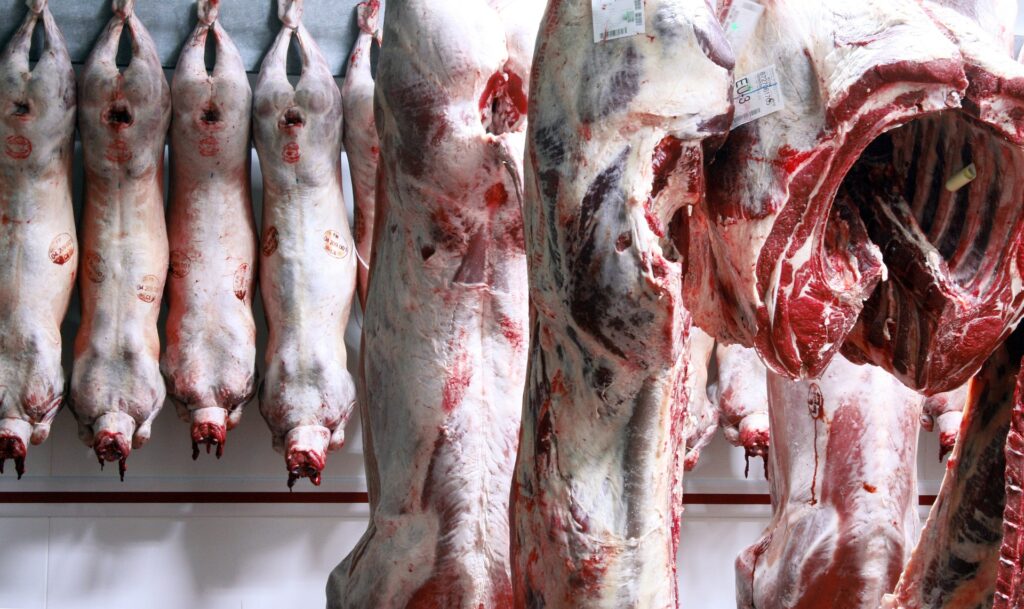You’ve probably heard that meat consumption has an impact on the environment, but have you ever considered just how significant that impact really is? In this article, we’ll answer the question “How Does Meat Consumption Impact The Environment?” and explore the various ways in which our love for meat affects the environment. From deforestation to greenhouse gas emissions, we’ll uncover the facts and shed light on the consequences of our dietary choices. So, if you’re curious to know what kind of footprint your dinner has on the planet, keep reading to find out more.
How Does Meat Consumption Impact The Environment: Water Usage
Overview
Meat consumption has a significant impact on the environment, particularly when it comes to water usage. The production of meat requires vast amounts of water throughout various stages, including animal rearing, feed cultivation, and processing. This high demand for water puts pressure on local water sources and can lead to water scarcity in some regions. Understanding the water footprint of livestock production and the issue of water pollution can shed light on the environmental consequences of meat consumption.
Water Footprint of Livestock Production
Livestock production accounts for a substantial portion of global water usage. The water footprint of livestock refers to the total volume of water consumed in the production and processing of animals for meat consumption. This includes the water used to grow animal feed crops, provide drinking water for animals, and maintain their hygiene. The intensive nature of livestock farming requires significantly more water compared to plant-based food production. Consequently, reducing meat consumption can help alleviate the strain on water resources and promote sustainable water management.
Water Pollution
The environmental impact of meat consumption extends beyond its high water usage. Livestock farming contributes to water pollution through several mechanisms. The excessive use of fertilizers and manure in animal feed cultivation results in runoff, which can contaminate nearby water bodies. This contaminated water can then cause algal blooms, deplete oxygen levels, and harm aquatic ecosystems. Furthermore, the disposal of animal waste, including urine and feces, can lead to further water pollution if not properly managed. Implementing sustainable farming practices and waste management systems can help minimize the water pollution associated with meat production.
How Does Meat Consumption Impact The Environment: Land Use
Conversion of Forest and Grassland into Pasture
One of the significant environmental impacts of meat consumption is the conversion of forests and grasslands into pasture for livestock. As the demand for meat rises, more land is cleared to make way for animal agriculture. This deforestation contributes to habitat loss for countless species and disrupts delicate ecosystems. It also leads to a decline in biodiversity and exacerbates climate change, as forests act as natural carbon sinks.
Grazing Pressure
Livestock grazing also exerts immense pressure on land resources. Overgrazing occurs when livestock consume vegetation faster than it can regrow, leading to the degradation of grazing areas. This damages soil fertility, reduces plant diversity, and increases the risk of erosion. Moreover, the trampling of soil by livestock hooves can compact it, making it less able to absorb and retain water. Reducing meat consumption can alleviate the grazing pressure on land, allowing for natural regeneration and healthier ecosystems.
Deforestation
The meat industry plays a significant role in driving deforestation, particularly in regions like the Amazon rainforest. Farmers clear vast areas of land to establish cattle ranches or to grow soybeans used for animal feed. This deforestation not only destroys vital habitats but also releases large quantities of carbon dioxide into the atmosphere. Forests are natural carbon sinks that help mitigate climate change by absorbing CO2. Thus, reducing meat consumption can help curb deforestation, preserve biodiversity, and combat climate change.
Check Out Our Top Eco Friendly Product Picks On Amazon Here
How Does Meat Consumption Impact The Environment: Greenhouse Gas Emissions
Overview
Greenhouse gas emissions are a pressing environmental concern, and the meat industry contributes significantly to these emissions. The production and consumption of meat produce substantial quantities of greenhouse gases, including carbon dioxide, methane, and nitrous oxide. These gases trap heat in the atmosphere, leading to global warming and climate change. Understanding the livestock industry’s contribution to greenhouse gas emissions and the displacement of carbon sinks is crucial in addressing these environmental challenges.
Livestock Contribution to Greenhouse Gas Emissions
Livestock farming is a major contributor to global greenhouse gas emissions. Methane is a particularly potent greenhouse gas released by ruminant animals, such as cattle and sheep, during digestion. Additionally, the waste management practices in animal agriculture, such as the decomposition of animal waste, contribute further to methane emissions. The production and transportation of animal feed, as well as the energy needed for meat processing and refrigeration, also contribute to greenhouse gas emissions. Reducing meat consumption can significantly reduce these emissions and help mitigate climate change.
Displacement of Carbon Sinks
Forests and other ecosystems act as vital carbon sinks, absorbing CO2 from the atmosphere and storing it in plants and soil. However, the meat industry’s impact on land use, particularly deforestation, disrupts this natural process. The conversion of forests into pastures reduces the Earth’s capacity to absorb and sequester carbon, leading to increased levels of CO2 in the atmosphere. By reducing meat consumption, individuals can support efforts aimed at preventing the displacement of carbon sinks, ultimately aiding in the fight against climate change.
How Does Meat Consumption Impact The Environment: Biodiversity Loss
Impact on Wildlife Habitats
Meat consumption contributes to the loss of wildlife habitats and poses a severe threat to biodiversity. Deforestation for livestock farming destroys natural habitats, displacing countless animal species. Forests are home to a vast array of wildlife, from mammals and birds to reptiles and insects. By reducing the demand for meat, we can help preserve these habitats and safeguard the biodiversity they support.
Species Extinction
The loss of habitats due to meat production increases the risk of species extinction. Many animal species rely on specific ecosystems for their survival, and when those ecosystems are destroyed, they face a higher likelihood of extinction. This loss of biodiversity disrupts natural ecosystems and can have far-reaching ecological consequences. By adopting a more plant-based diet and reducing meat consumption, we can help protect endangered species and promote biodiversity conservation.
Invasive Species
The transportation of animals for livestock farming can introduce invasive species into new environments. Invasive species are non-native species that spread rapidly and outcompete native species for resources. This disrupts ecological balance and can lead to the decline or extinction of native flora and fauna. By reducing meat consumption, we can minimize the potential introduction of invasive species and protect the delicate ecological balance of our ecosystems.

How Does Meat Consumption Impact The Environment: Deforestation
Clearing of Forests for Livestock Farming
The meat industry drives the clearing of forests to make way for livestock farming operations. This deforestation occurs on a large scale in regions like the Amazon rainforest, where forests are ruthlessly cleared to establish cattle ranches. The destruction of forests not only results in the loss of valuable habitats but also releases significant amounts of CO2 into the atmosphere, contributing to climate change. By reducing meat consumption, we can support efforts to halt deforestation and preserve vital forest ecosystems.
Soybean and Cattle Farming
Soybean production is closely linked to livestock farming, particularly due to its use as animal feed. The expansion of soybean cultivation for animal feed leads to further deforestation, as vast areas of land are cleared to grow these crops. This deforestation poses a severe threat to biodiversity and releases carbon stored in the forest into the atmosphere. By cutting back on meat consumption, we can reduce the demand for soybeans and help protect forests from being converted into agricultural land.
Loss of Carbon Storage
Forests play a crucial role in carbon storage, absorbing CO2 from the atmosphere and storing it in plant biomass and soil. When forests are cleared for livestock farming, this natural carbon storage capacity is lost. The release of carbon into the atmosphere exacerbates climate change and contributes to global warming. By choosing plant-based alternatives and reducing meat consumption, we can actively support the preservation of forests as carbon sinks and combat climate change.
How Does Meat Consumption Impact The Environment: Water Pollution
Manure and Fertilizer Runoff
The intensive use of fertilizers and manure in animal agriculture contributes to water pollution through runoff. When excessive fertilizers and manure are applied to fields or pastures, they can be washed away by rain or irrigation and enter nearby water bodies. This runoff carries pollutants such as nitrogen and phosphorus, which can cause imbalances in aquatic ecosystems. By reducing meat consumption and promoting sustainable farming practices, we can help minimize the runoff of these pollutants and protect water quality.
Contamination of Water Bodies
The contamination of water bodies is a significant environmental concern associated with meat production. The runoff from livestock farms, carrying pollutants such as fecal matter, antibiotics, and hormones, can contaminate rivers, lakes, and groundwater sources. This contamination poses risks to both human and aquatic life, affecting water quality and ecosystem health. By reducing meat consumption and supporting sustainable farming practices, we can play a role in preserving the integrity of our water bodies and safeguarding the health of aquatic ecosystems.
Algal Blooms
The excess nutrients, particularly nitrogen and phosphorus, from livestock farming can stimulate the growth of algae in water bodies, leading to algal blooms. These blooms can have detrimental effects on aquatic ecosystems, depleting oxygen levels and causing harm to fish and other aquatic organisms. Moreover, some algal blooms produce toxins that can contaminate drinking water sources, posing risks to both human and animal health. By reducing our meat consumption and advocating for sustainable agriculture, we can help combat algal blooms and protect the well-being of our water ecosystems.

How Does Meat Consumption Impact The Environment: Overfishing
Depletion of Fish Stocks
Meat consumption not only impacts land-based ecosystems but also has severe consequences for marine environments. Overfishing, driven by the demand for seafood, has depleted fish stocks worldwide. This depletion disrupts marine food webs and threatens the survival of numerous fish species. By reducing our reliance on meat and diversifying our diets to include sustainably sourced seafood, we can support the conservation of fish stocks and promote responsible fishing practices.
Ecosystem Disruption
Overfishing disrupts marine ecosystems, leading to imbalances in species populations and ecological interactions. The removal of certain fish species at unsustainable rates can trigger cascading effects throughout the food chain. This disruption can result in declines in other species, altering the structure and function of marine ecosystems. By reducing meat consumption and choosing sustainably sourced seafood, we can contribute to the restoration and stability of marine ecosystems.
Unintended Bycatch
Commercial fishing practices often result in unintended bycatch, the accidental capture of non-target species. This includes species such as dolphins, turtles, seabirds, and sharks, which are often killed or injured as a result. By reducing meat consumption and supporting sustainable fishing methods, we can help minimize unintentional bycatch and protect the delicate balance of marine ecosystems.
How Does Meat Consumption Impact The Environment: Waste Management
Animal Waste Disposal
Animal waste management is a critical environmental concern associated with meat production. Large-scale livestock operations generate vast amounts of manure, which must be properly disposed of to prevent environmental contamination. Inadequate waste management practices can lead to the release of harmful pollutants into soil, water sources, and the air. By reducing meat consumption, we can help decrease the volume of animal waste generated and alleviate the challenges associated with its disposal.
Methane Production from Decomposing Waste
The decomposition of animal waste, particularly in anaerobic conditions, produces methane, a potent greenhouse gas. Methane has a significantly higher warming potential than carbon dioxide. Thus, improper animal waste management contributes to climate change by releasing substantial amounts of methane into the atmosphere. By reducing meat consumption and advocating for sustainable farming systems, we can help minimize methane emissions from animal waste and mitigate climate change.
Air and Water Pollution
Improper animal waste management can lead to air and water pollution. When animal waste is not adequately contained or treated, it can release ammonia, hydrogen sulfide, and other harmful gases into the atmosphere. These gases can contribute to air pollution and have detrimental effects on human and animal health. Similarly, if animal waste enters water bodies through runoff or inadequate storage, it can contaminate water sources, posing risks to aquatic ecosystems and human consumption. By reducing meat consumption and supporting sustainable farming practices, we can help minimize air and water pollution associated with animal waste.

How Does Meat Consumption Impact The Environment: Antibiotic Resistance
Overuse of Antibiotics in Livestock
Antibiotics are routinely used in livestock farming to prevent disease and promote growth. However, the widespread use of antibiotics in animal agriculture contributes to the development of antibiotic-resistant bacteria. Overexposure to antibiotics can lead to the emergence of superbugs that are resistant to these life-saving drugs. By reducing meat consumption, we can help reduce the demand for antibiotics in animal agriculture and mitigate the risk of antibiotic resistance.
Transfer of Antibiotic Resistance Genes
The overuse of antibiotics in livestock farming not only contributes to antibiotic resistance but also facilitates the transfer of resistance genes between bacteria. This transfer can occur between bacteria within the animals themselves, as well as between animals, humans, and the environment. The spread of antibiotic resistance genes poses a significant public health risk, as it limits the effectiveness of antibiotics in treating infections. By reducing meat consumption and supporting sustainable farming practices that minimize antibiotic use, we can contribute to combating antibiotic resistance and protecting human health.
Public Health Risks
The emergence of antibiotic-resistant bacteria in animal agriculture can have severe public health implications. When humans consume meat contaminated with antibiotic-resistant bacteria, they can become infected, and treatment options may be limited or ineffective. Additionally, the transfer of antibiotic resistance genes from animals to humans can occur through direct contact or environmental pathways, further increasing the risk of antibiotic-resistant infections. By reducing meat consumption and advocating for responsible antibiotic use, we can help safeguard public health and preserve the effectiveness of antibiotics for future generations.
How Does Meat Consumption Impact The Environment: Human Health Impacts
Dietary Link to Diseases
Meat consumption has been linked to the development of various diseases, including heart disease, certain types of cancer, and obesity. Diets high in red and processed meats have been shown to increase the risk of cardiovascular problems and certain cancers, such as colorectal cancer. Additionally, the high saturated fat and cholesterol content in meat products can contribute to obesity and related health issues. By reducing meat consumption and adopting a more plant-based diet, individuals can lower their risk of these diseases and promote overall well-being.
Foodborne Illnesses
Meat consumption carries the risk of foodborne illnesses, caused by bacteria such as Salmonella, E. coli, and Campylobacter. Improper handling, storage, and cooking of meat can lead to contamination and subsequent illness. Foodborne illnesses can cause symptoms ranging from mild gastrointestinal discomfort to severe complications requiring hospitalization. By practicing safe food handling and reducing meat consumption when sourcing and preparing meals, we can minimize the risk of foodborne illnesses and protect our health.
Pesticide Exposure
Certain pesticides and chemicals used in livestock farming can have adverse health effects on workers and communities living near agricultural areas. These chemicals can contaminate water sources, soil, and air, raising concerns about their impact on human health. By reducing the demand for meat and supporting organic and sustainable farming practices, we can contribute to reducing pesticide exposure and promoting a healthier environment for all.
In conclusion, meat consumption has profound environmental impacts across various aspects, including water usage, land use, greenhouse gas emissions, biodiversity loss, deforestation, water pollution, overfishing, waste management, antibiotic resistance, and human health. By reducing our meat consumption, adopting more plant-based diets, and supporting sustainable and ethical farming practices, we can positively contribute to protecting the environment, preserving biodiversity, mitigating climate change, and fostering better health for all.




